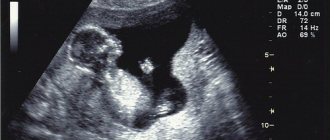Toxicosis during pregnancy is a common condition that many consider normal. Accompanying toxicosis are nausea, vomiting, weight loss and anxious mood. The deterioration of the expectant mother's condition is associated with toxins entering the body due to imperfections in the structure of the placenta. But this is only one of the reasons. What is toxicosis during pregnancy? Does it really happen to everyone? And most importantly, when is it dangerous and what to do?
The development of toxicosis of varying degrees during pregnancy is influenced by a number of events and processes, which are discussed in more detail below. From the article you will learn what toxicosis is and why it appears, how to detect it, whether there can be a condition with manifestations of toxicosis throughout pregnancy and when it’s time to sound the alarm. In addition, you will find useful information about the treatment of toxicosis and the connection between nausea and vomiting during pregnancy and the gender of the child.
What is this condition
Doctors consider this concept much broader than we are all used to thinking. In this term, doctors include any disorders in a pregnant woman associated with the negative effects of toxins on the female body during pregnancy. It should be noted that toxins can be exogenous and endogenous. In the first case, we are talking about microorganisms of the bacterial type.
When they reach a person, they poison the body with the products of their decay. Toxicosis during pregnancy is considered endogenous and develops as a result of the formation of substances during metabolic processes in a woman’s body.
Symptoms of poisoning
Manifestations of intoxication in the body can be observed within 1-2 hours after eating and largely depend on which product caused the poisoning. As a rule, the classic symptoms are easy to recognize:
The pregnant woman begins to experience severe nausea, which ends in vomiting. The latter brings relief for a short time, after which the nausea returns.- There is a sharp, dull or paroxysmal pain in the stomach or intestines.
- An upset stomach is always an indicative symptom of poisoning. With dysentery, the stool becomes profuse and watery, and with salmonellosis it becomes green in color.
- In severe forms of intoxication, the woman’s temperature rises, general weakness and headache occur.
- Mushroom poisoning is characterized by rapid deterioration of the condition, impaired consciousness and hallucinations.
Causes
Why does toxicosis appear? To date, it is not possible to determine the exact reasons. Scientists suggest that this condition may develop under the influence of the following provoking factors:
- Hormonal changes in the body. Changes at the hormonal level begin to occur from the first days after conception. Now the organs and systems of a pregnant woman function in a special mode, so various malfunctions are often observed.
- Formation of the placenta. Some scientists believe that toxicosis is most pronounced during the formation of the placenta.
- Immune response. Embryonic cells are recognized by the immune system as foreign bodies. Often this even provokes fetal rejection. In other cases, the baby develops, but the girl may experience discomfort.
- Chronic diseases in the mother. Symptoms of intoxication of the body may appear more severely if a woman has any diseases of the internal organs or systems.
- Disturbances in the functioning of the central nervous system. It is known that all processes occurring in our body are controlled by the central nervous system. If the Central Nervous System malfunctions, this can have a negative impact on overall well-being.
- The age of the pregnant woman is up to 18 or after 35 years.
- Genetic predisposition. If close relatives of the expectant mother suffered from nausea and vomiting, the likelihood of toxicosis increases significantly.
Psychological factors are of no small importance. Fears and worries negatively affect the overall well-being of the mother. It is very important during this period to try to calm down and set yourself in a positive mood. The task of loved ones is to support the pregnant woman as much as possible. This will help eliminate various complications and carry a healthy baby.
A fairy tale with a happy ending
Well, as a result, I’ll tell you that my toxicosis ended only in the maternity ward. On the maternity chair. How it was cut off. Along with my daughter's umbilical cord. But I lost weight! And after giving birth, I weighed 15 kg less than before. Every place has its advantages, right?
! Later I learned that the condition I have is called Hyperemesis Gravidarum, excessive vomiting of pregnancy. It affects only about 2% of pregnant women. The rest suffer from toxicosis not so much.
But no matter how hard it is, it is important to remember that everything ends in the end. And you get a result that you wouldn’t exchange for anything in the world: your little miracle!”
Photo: shutterstock; instagram; unsplash.com
Development mechanism
Immediately after the onset of conception, hormonal changes occur in the body of the expectant mother. Many girls begin to notice mood changes, changes in taste, smell and other signs from the first days of pregnancy. This is the beginning of toxicosis.
After conception occurs, a temporary center is formed in the woman’s cerebral cortex, which doctors call the “pregnancy center.” Its main functions are to control the physiological functions of the body throughout the entire process of bearing a baby. Undoubtedly, for the healthy bearing of a toddler, this center is extremely necessary, but its work often provokes some malfunctions in the functioning of other organs, which is accompanied, for example, by increased production of saliva, increased activation of the gag reflex, increased sweating, and so on.
In this regard, mommy experiences symptoms such as headache, chills, changes in taste, increased sensitivity to smells, increased sweating or salivation during sleep, and much more. In addition, the concept of toxicosis includes such signs as dyspeptic disorders (nausea, vomiting, heartburn, belching, bloating, stool disturbances). The functioning of the nervous, cardiovascular and urinary systems also changes.
Doctors judge the degree of this condition by taking into account not one, but all the signs of this condition. Methods to combat the condition in question depend on the severity of its course in a particular patient.
Useful tips
- You should not immediately get out of bed after waking up . It is best to sit quietly and stay in this position for 7-10 minutes. During this time, you can eat cereal cookies or a few nuts - this measure will help cope with dizziness and reduce the symptoms of nausea.
- The kitchen and other rooms where odors can accumulate (for example, the restroom) must be regularly ventilated.
- To combat headaches, you need to walk a lot , preferably in parks.
- If the expectant mother is not allergic to plants, you can put several pots in the room where the woman spends the most time . Plants produce additional oxygen, which is so lacking for residents of large cities.
When does it start and how long does it last?
To date, the true factors that provoke toxicosis have not been fully studied. The reaction of the female body to pregnancy remains largely unclear to scientists. The main theory explaining the origin of the condition in question is immune. In simple words, the immune system cannot understand why it is impossible to destroy a foreign organism that develops in the womb of a woman.
After fertilization of the egg by the sperm, active production of the hormone progesterone begins. Thanks to it, the reproductive organ is prepared for implantation, and nutritional components and fats accumulate in the pregnant woman’s body. The immune system recognizes only the father's genetic material as a foreign organism. Women's genes are considered native.
To prevent the immune system from destroying the embryo, progesterone suppresses it. It is believed that in mothers with strong natural defenses, toxicosis is always more pronounced, since their immunity does not give up until the last moment. During the process of suppressing a woman’s body’s defenses, various biochemical changes occur, which leads to internal intoxication.
First manifestations
Based on the above information, the first manifestations of toxicosis can begin immediately after fertilization. The introduction of a fertilized egg into the wall of the uterus occurs approximately on the 7th-8th day. Immediately after this, the production of another substance begins, namely human chorionic gonadotropin, which is designated by the abbreviation hCG. This substance also specifically affects a woman’s well-being. HCG accumulates slowly in the body, so the first signs of intoxication may develop in about a week, that is, approximately by the date when the girl is expecting her next period. Clear signs of toxicosis, according to medical statistics, usually appear 5-6 weeks after conception, less often 3-4 weeks after fertilization.
How long does it last?
If we talk about how long this unpleasant condition can last for mommy, even the most experienced doctor is unlikely to be able to give an accurate answer. Here a lot depends on the individual characteristics of the organism. According to many experts, toxicosis often lasts up to 14-16 weeks. Reviews from mothers indicate that they began to experience relief after approximately 12-14 weeks. Less often, negative signs persist until 18-21 weeks.
In the morning, the level of sugar in the body is much lower than in the afternoon. In this regard, discomfort in pregnant girls most often occurs in the morning. Despite this, the signs of this condition persist throughout the day in many women.
Symptoms of toxicosis during pregnancy
Vomiting and nausea – these are precisely the manifestations we mean when we talk about early toxicosis in mothers while carrying a baby. In fact, there are much more manifestations. These include:
- Decreased appetite and weight.
- Mood changes, emotional depression, anxiety.
- Frequent depression.
- Difficulty falling asleep, decreased sleep quality.
- Drowsiness, fatigue.
- Irritability.
- Headaches, migraines, occurring periodically or constantly present.
- Increased body temperature.
- Increased sweating.
- Increased salivation.
- Dry skin.
- Decrease or, conversely, increase in blood pressure.
- Heart rhythm disturbance.
A woman carrying a child can independently assess the severity of this condition. She needs to inform the leading gynecologist about this.
If there are no negative manifestations, do not worry. Perhaps you are one of the moms who is lucky enough to experience no negative symptoms at all.
There are several types of toxicosis during pregnancy. They can be seen in the table.
Treatment
If a doctor assesses a woman’s condition as unsatisfactory due to toxicosis tormenting her, drug therapy is prescribed to relieve symptoms and improve well-being. Treatment steps include:
- Taking antispasmodic drugs (of the entire list, only “No-spa” is allowed for pregnant women);
- Prescribing vitamin-mineral complexes to prevent deficiency of nutrients;
- The use of homeopathic tablets for toxicosis that are safe for the fetus.
Medicines that can be prescribed to women diagnosed with severe toxicosis:
- " Meclozin " is an antihistamine drug;
- " Metoclopramide " - improves the passage of food, helps fight nausea;
- " Hofitol " - improves the outflow and movement of bile, normalizes the condition of the liver;
- Ondansetron - vomiting drug.
In very severe cases, a woman may be hospitalized in a hospital. The treatment regimen in a hospital setting changes somewhat and includes the appointment of IVs with special medications.
The method of immunocytotherapy can also be used. This is a fairly new method of treating toxicosis, which is used very rarely in practice. With this type of therapy, the woman's forearm is injected with her husband's lymphocytes. Significant improvement occurs in the first day after administration.
This procedure is performed only in a hospital setting, as full control and follow-up of the patient’s condition is necessary. Before the procedure, the husband must undergo a series of tests for various infectious diseases, such as hepatitis and HIV.
Folk recipes
- Aromatherapy . If a pregnant woman suffers from bouts of morning sickness, you can try to cope with them with the help of essential oils. Peppermint or ginger oil is perfect for these purposes. You can put a few drops of oil on a handkerchief and place it under your pillow. This measure helps to reduce the urge to vomit in the morning, and also has a beneficial effect on the nervous system and has a slight calming effect.
- An excellent way to cope with an attack of nausea is to rinse your mouth with an infusion of medicinal herbs : chamomile, mint, sage, calendula.
- lemons (or any other sour fruit) to combat toxicosis To do this, take a slice of lemon and put it on your tongue. Keep in mouth for about 10 minutes.
- Cranberry juice works great against vomiting and nausea, so you need to include it in your diet as often as possible. In addition, it will help enrich the body with essential vitamins.
- Ginger tea . To prepare it, you need to take a piece of ginger root (3-4 cm long), grate it and pour a glass of boiling water over it. Leave for 7-10 minutes. If desired, you can add honey, orange zest or cinnamon.
Toxicosis during pregnancy: when it starts, how long it lasts and how to deal with it
Toxicosis literally means poisoning of the body, a popular word for denoting a condition during pregnancy. The name is not true, no poisoning occurs. Changes occur, sometimes causing some difficulties during pregnancy. Who said that giving birth to a human being is easy?
The period of being in an interesting position is calculated in different ways.
A pregnancy lasting up to 38-42 weeks is considered normal, it all depends on the individual characteristics of the body.
Such a phenomenon as gestosis is an individual concept and in most cases depends on a hereditary factor.
Traditional medicine
Traditional medicine, the recipes of which are simple to prepare at home, will tell you how to alleviate the condition of toxicosis and vomiting during pregnancy.
- Sea buckthorn with mint and rose hips. It is necessary to take equal parts of sea buckthorn and mint leaves and dry rose hips and pour boiling water into a thermos. Let the solution sit for two to three hours. Before use, add lemon juice and drink cold several times a day.
- Cranberries with mint and honey. Boil some of the prepared cranberry juice with mint leaves. Then add honey and a couple of tablespoons of lemon juice to the resulting solution. Before use, stir half-and-half with fresh cranberry juice. Drink throughout the day.
- Rose hips and apples. Take equal parts of dried rose hips and apples. Pour hot water and let it brew for 15-20 minutes. After this you can use it throughout the day. You can add honey for sweetness.
- Pumpkin with honey and lemon. Another effective folk remedy is pumpkin juice. To improve the taste, you can add honey and a few drops of lemon juice per serving.
- Simple ginger. Chewing ginger root saves many pregnant women from motion sickness on public transport and reduces the number of episodes of vomiting.
What is toxicosis in a pregnant woman?
Pregnancy is a kind of stress for the body. A nauseating condition, aggravated by swelling, pressure surges, cramps of the limbs, etc.
The work of all systems is restructured and the processes occurring in connection with this sometimes cause a deterioration in the woman’s condition.
Toxicosis can be caused by:
- heredity;
- changes in hormonal levels;
- fear (the emergence of psychoneurological problems);
- decreased immunity;
- vitamin deficiency;
- various infections;
- age-related pregnancy;
- spasms of the body's blood vessels.
Gestosis within the bounds of decency
Expectant mothers are interested in knowing when toxicosis begins and how does it manifest itself?
There are several forms of toxicosis.
Toxicosis of the first half of pregnancy
At the very beginning of pregnancy, signs of incipient toxicosis can be a dislike of sharp sounds, smells, and people around. This is related to physiology. Man, who considers himself the crown of creation, is still part of the animal world. The female, on a subconscious level, protects her child. Tries to protect him from the unwanted influence of the surrounding world. Hence the mood swings, sometimes even anger. Dilated pupils, unnatural shine in the eyes. The work of the salivary glands increases (the amount of saliva secreted can reach one liter per day). And here in front of you is an angry she-wolf, ready to “kill” for her cub.
At this moment, the immune system and the body’s resistance to viruses sharply decrease. The human herpes virus is especially dangerous, causing miscarriages. Therefore, rest and taking vitamins is vital.
Later, a feeling of nausea arises, sometimes turning into vomiting. This is how the body reacts to an increase in the level of pregnancy hormone (hCG). The restructuring of metabolism in the mother’s body begins to nourish the baby.
As the placenta develops, nausea subsides or disappears altogether. There is no threat to the baby's life if toxicosis does not deplete the mother.
In rare cases, a conflict between mother and child hormones occurs. The reasons for this may be multiple pregnancies or differences in Rh factors in the blood.
In the first or second trimester, hemoglobin levels may drop sharply. This condition is caused by vitamin deficiency. Two vitamins require more. Especially iron and folic acid.
Iron helps enrich blood cells with oxygen. Folic acid promotes proper brain development. Taking vitamins is especially important during the formation of the internal organs of the fetus.
No exact data has yet been obtained on how long primary toxicosis lasts, but approximately from the first to the twentieth week.
Toxicosis of the second half of pregnancy
Lasts from approximately the twentieth week until the planned date of birth.
- As the weight of the fetus increases and its need for minerals and vitamins increases, a lack of calcium and magnesium becomes acute, leading to cramps in the mother’s limbs.
- An increase in blood volume in the body increases the pulse rate and provokes shortness of breath, profuse sweating and surges in blood pressure.
- As the baby's weight increases in the womb, pressure occurs on the mother's internal organs. Constipation occurs. Pressure on the kidneys causes swelling.
Toxicosis in the second half of pregnancy is often accompanied by heartburn, which occurs during the formation of the baby's hair.
Preeclampsia in the second half of pregnancy is especially dangerous because it can cause hypoxia (lack of cerebral circulation) and delayed fetal development.
Swelling can lead to polyhydramnios and affect your overall health. Increased body weight creates additional stress on the joints. A pregnant woman may be at risk of varicose veins.
There are a number of drug treatments. Do not give up on them; modern medications do not harm the baby.
When talking about gestosis, it is necessary to take into account the hereditary factor. Often, the course of a daughter’s pregnancy follows the fate of the mother. In this case, the rule works: “Forewarned is forearmed.”
Hereditary (less commonly acquired) kidney disease provokes nephropathy. Women swell a lot. As a result, protein appears in the urine, and the body does not remove accumulated toxins that are harmful to the child.
Hereditary hypertension is a threat to mother and fetus. Blood vessels may burst during childbirth. It’s scary to even think about the irreversibility of the consequences.
As the time of birth approaches, the psychoneurological state of the woman changes. Neurosis of the pregnant woman arises. Why is neurosis dangerous? Fear of the unknown can lead to convulsions at best. In the worst case, to disorders due to which the pregnancy will end in caesarean section.
Pregnancy after forty years should also proceed under the supervision of a specialist. Hormone levels and the general condition of the body require special control.
In any case, by seeing a competent specialist and correctly following all the instructions, a woman can be calm about her health and the health of her baby. Under no circumstances should you ignore the offer of hospitalization.
Classification
There is the following classification of toxicosis of the first half of pregnancy:
- vomit;
- ptyalism (drooling);
- dermatosis of pregnant women;
- tetany;
- osteomalacia;
- acute fatty liver degeneration;
- according to the type of bronchial asthma.
In 85% of cases, you have to deal with vomiting during pregnancy, so it is advisable to consider it separately. All other options are characterized by an acute course, serious complications in which it is necessary to terminate the pregnancy to save the woman’s life.
Toxicosis - what to do?
Toxicosis can be prevented by timely planning of pregnancy and its course under the strict guidance of an experienced doctor.
There are, of course, home (folk) ways to combat primary toxicosis:
- rye bread with salt on an empty stomach;
- mint tea with lemon;
- mineral water;
- steamed food;
- fructose lozenges during attacks.
As an option, within acceptable limits - homeopathy and aromatherapy. The remedies are, of course, controversial, but do not harm the body of the mother and child. If your doctor is not against the use of such substances, then you can use essential oils instead of perfumes or in an aroma lamp for inhalation. Various homeopathic lozenges must also be “censored” by the attending physician.
If the symptoms do not disappear, there is a reason to go to the hospital for examination. Many people think about how to avoid toxicosis? It's practically impossible. Heredity often dictates whether this process will be easy or not. But some recommendations for not worsening the condition still exist.
Eat mostly protein foods. It is less likely to cause nausea and helps avoid swelling. The diet should consist of lean steamed meat, fish, various broths, and dairy products.
Daily routine and diet help cope with severe intoxication
In mild to moderate stages of intoxication, when vomiting occurs no more than ten times a day, and weight loss does not exceed three kilograms, you can alleviate the symptoms by following simple recommendations.
The first thing you should do is change your diet and eating habits. Fatty, fried, and salty foods are excluded from a pregnant woman's diet. It is better to eat in small portions at short intervals. After breakfast, don’t run errands, find a few minutes to relax and lie down. A woman's diet should contain a large amount of plant foods and vegetables, complex carbohydrates and proteins.
| A healthy diet and proper daily routine will help you |
Drinking plenty of liquid - fruit drinks, chamomile tea, rosehip infusion, water with honey, mint will prevent dehydration. To relieve nausea, you can add pieces of fresh ginger to water or tea. Herbal teas based on mint, calendula, valerian have a calming effect and have a beneficial effect on the gastrointestinal tract. You can drink fresh citrus juice in the morning, tea with lemon - proven remedies for toxicosis, take vitamin C and B6.
Get into the habit of doing morning exercises; improving blood circulation after light physical activity will help avoid morning sickness. And completely give up nicotine, even eliminate the possibility of passive smoking.
Causes of toxicosis during pregnancy
The true causes of toxicosis during pregnancy during the period of bearing a child in our time remain unexplored. It is impossible to say absolutely precisely about the nature of the occurrence of toxicosis symptoms.
But it is still possible to identify some causes of toxicosis:
- Malfunction of the hormonal system. From the first seconds that a woman becomes a future mother, she begins to experience dramatic changes in her hormonal system. Their composition undergoes changes, and accordingly the woman’s well-being and her mood change. Signs appear: irritability, touchiness, tearfulness, nausea during pregnancy, and an increased sense of smell. This is due to the fact that the mother’s body accepts the child as a foreign body. But by the 12th week, the symptoms of toxicosis during pregnancy gradually weaken.
- Formation of the placenta. The fact is that when the process of placental development is completed, the placenta takes over all the functions of filtering harmful substances. In this regard, after 12 weeks the expectant mother’s well-being improves. Until then, the function of the filter is performed by the female body.
- The body of the expectant mother triggers a protective reaction. In this case, toxicosis during pregnancy is even useful and biologically necessary. A pregnant woman feels nausea during pregnancy and the urge to vomit when smelling cigarettes, coffee, or alcohol. Thus, the mother and fetus are protected from dangerous and harmful substances
- Chronic diseases. This is due to the fact that if the mother’s immunity is weakened by bacterial or viral diseases, this contributes to the appearance of toxicosis
- Neuropsychic stress. Dramatic changes occur in the nervous system of a pregnant woman, and the areas of the brain responsible for the sense of smell and the gastrointestinal tract are especially activated. Toxicosis can also be caused by stress, lack of sleep, and irritability of the expectant mother. In addition, many pregnant women psychologically convince themselves that they must have toxicosis, since everyone has it.
- Age of the expectant mother. If pregnancy occurs after 30 years of age, and even more so if this is the first pregnancy or there have been many abortions before, then it is much more difficult for a woman to endure toxicosis during pregnancy. Its manifestations are more intense than in younger women.
- Genetic factors can also influence the occurrence of toxicosis. If in the previous generation someone suffered from toxicosis, then the risk of its occurrence increases.
- Multiple pregnancy gives not only double or triple joy, but also intense manifestations of toxicosis. But it should be borne in mind that if a woman overcomes toxicosis in the early stages of pregnancy, then the risk of miscarriage is practically eliminated, which is very important.
Signs and duration
It is important to be able to distinguish ordinary poisoning from toxicosis during pregnancy at different stages. Expectant mothers feel sick and vomit when intoxicated, but not only that. Manifestations of toxicosis during pregnancy are:
- excessive salivation;
- loss of appetite;
- mood changes;
- sense of anxiety;
- weight loss;
- prostration;
- drowsiness.
***
In rare forms of early toxicosis in pregnant women, the following are observed:
- tetany;
- dermatosis;
- bronchial asthma;
- yellow liver atrophy;
- osteomalacia.
The manifestations of toxicosis are very individual, depending not so much on the duration of pregnancy, but on the lifestyle after the “implantation” of the egg into the uterus and the personal characteristics of the body. Some women tolerate pregnancy and toxicosis easily, limiting themselves to slight nausea in the morning, others suffer from the most severe forms of toxicosis and are forced to spend most of their pregnancy in a hospital for treatment.
The duration of toxicosis also varies. Early intoxication, which begins from 3-4 weeks of pregnancy, is considered the norm. Toxicosis passes in the second half of pregnancy, that is, it coincides with the end of the formation of the placenta. If the pregnancy proceeds without complications, the second trimester should not provoke the manifestation of signs of toxicosis, allowing the child to receive the necessary nutrients for full development.
With the third trimester everything is more complicated. The disturbing toxicosis, which has subsided especially in the early stages, can make itself felt with renewed vigor. In such cases, this is a pathology that already has a name - gestosis. In some pregnant women, late toxicosis appears in the absence of early toxicosis.
In any case, gestosis is a reason to strengthen medical control to prevent dangerous consequences. When it manifests itself, the pregnant woman experiences severe swelling, blood pressure rises, and a number of additional signs appear indicating a deterioration of the condition.
***
At what stage does toxicosis occur during pregnancy?
By listening to their body and the unusual changes that occur in it, many women try to determine whether pregnancy has occurred or not. But none of them can say with absolute accuracy when toxicosis begins during pregnancy. Doctors usually distinguish two types of toxicosis according to the timing of its appearance: early toxicosis and late toxicosis.
- Typically, early toxicosis during pregnancy begins from the first days of a missed period and ends by the beginning of the second trimester, that is, approximately 12-13 weeks. Although all cases are individual and there are no specific restrictions and frameworks in this matter.
- Late toxicosis during pregnancy begins at the beginning of the last third trimester, or even in the middle of the second. Late toxicosis during pregnancy is very dangerous for both mother and child. Modern studies have shown that late toxicosis during pregnancy is a serious disease of the entire body, which is characterized by pathological changes in the functioning of the most important systems and organs. The reason for this is disturbances in the functioning of the nervous system, which provoke problems with the vascular system. As a result, the main symptoms of late toxicosis appear, which are manifested by vascular disorders and circulatory disorders: hypoxia occurs, brain functions change, metabolism, liver and kidney function are disrupted.
Is this condition dangerous?
A mild degree of toxicosis will not affect the development of the baby in utero. But if changes occur in urine, general and biochemical blood tests, metabolic products can have a negative effect on fetal growth.
In addition, the safety of all drugs used to treat toxicosis has not been proven. And if they do not have a visible teratogenic effect, then the long-term effect is unknown. Therefore, the prescription of any medications should be treated with caution.
Also dangerous are ketone bodies (acetone), which are formed when metabolism is distorted under conditions of nutritional deficiency and dehydration. They penetrate the placental barrier and can have a toxic effect on brain cells.
Moderate and severe forms of toxicosis are dangerous for women due to their consequences. They lead to disruption of a woman’s psycho-emotional state, disrupt her sleep, lead to exacerbation of chronic diseases and can even threaten life (for example, acute fatty liver, kidney failure).
If a woman has any serious diseases, for example, diabetes, against the background of toxicosis it is very difficult to maintain its compensation. As a result, episodes of hypo- and hyperglycemia affect not only the woman’s health, but also the formation of the baby’s tissues, increasing the risk of defects.
Why does toxicosis cause nausea during pregnancy?
The hormone progesterone underlies the appearance of nausea during toxicosis. Hormones such as human chorionic gonadotropin (hCG) and prolactin also play an important role in the appearance of this unpleasant manifestation of toxicosis. But in all women, toxicosis during pregnancy manifests itself to varying degrees. This is explained by the fact that each woman’s body is individual. The manifestations of nausea increase if a woman had problems with the gastrointestinal tract before pregnancy. Sharp changes in stomach acidity in combination with hormonal fluctuations lead not only to nausea, but even severe vomiting.
Problems in the functioning of the endocrine, nervous and immune systems of a pregnant woman also play an important role in the appearance of nausea during toxicosis. In addition, a genetic factor should not be ruled out. If the mother experienced toxicosis during pregnancy, then most likely the daughter will also suffer from its unpleasant manifestations.
Nutrition
Since the main symptom of toxicosis in the early stages is nausea, special attention should be paid to nutrition. By following simple recommendations, you can, if not completely get rid of this unpleasant phenomenon, then at least minimize its manifestations.
The most basic rules for pregnant women suffering from various forms of toxicosis:
- Eat in small portions every 2-2.5 hours;
- During the period of exacerbation of toxicosis, completely exclude fried foods , smoked foods, spicy foods and any marinades;
- In case of severe attacks of nausea, you can snack on fruits, nuts (in reasonable quantities), mints, or, in extreme cases, use regular chewing gum;
- Drink more liquid : fruit drinks, compotes, regular drinking water;
- Eat more foods containing vitamin B6 , as it helps prevent nausea and vomiting (fish, meat, chicken, eggs, nuts and legumes);
- It is advisable to avoid burning food - first courses should be eaten when they have cooled to a temperature of 32-33 degrees;
- Morning porridge should be cooked in water - this will help avoid nausea in the first half of the day.
Types of toxicosis during pregnancy
There are the following types of toxicosis: staphylococcal, evening, early toxicosis, late toxicosis, toxicosis before a missed period.
- Staphylococcal toxicosis can be activated by enterotoxigenic strains. It appears a few hours after the last meal that turned out to be contaminated. Symptoms of this type of toxicosis are cramping abdominal pain, diarrhea, vomiting and nausea. There are no neurological disorders, rash or high fever. Recovery occurs on its own within 12 hours.
- Evening toxicosis can occur as a result of severe fatigue, overexertion and insufficient food intake throughout the day. The body is exhausted in the evening, and toxicosis occurs. This type of toxicosis disrupts normal sleep and rest. You can overcome it by walking in the evening and drinking fresh juice from sour fruits and vegetables.
- Early toxicosis can appear at 1-14 weeks of pregnancy. Doctors advise to calmly perceive the manifestations of toxicosis. If the condition is quite severe, the attending doctor may prescribe medications that will alleviate the condition of the pregnant woman. But it should be remembered that if you stop taking these drugs, the symptoms of toxicosis will immediately resume. It is better to use traditional medicine for this purpose. Moreover, it will not be so dangerous for the baby.
- Late toxicosis during pregnancy, which proceeds without complications, usually does not manifest itself. But there are cases when toxicosis is manifested by severe nausea and vomiting. If unfavorable factors are added, the symptoms of toxicosis increase, and a dangerous condition occurs, called gestosis. It is characterized by swelling, protein in the urine, high blood pressure, and weight gain of 400 grams in one week. In this case, the expectant mother should be immediately hospitalized in a hospital.
- Toxicosis before missed period. Sometimes nausea can develop immediately after conception. But this does not mean pregnancy has occurred. Toxicosis can appear within a week after the development of the fertilized egg.
Diagnostics: what does the examination include?
The diagnosis of toxicosis is made based on the clinical picture. Pregnant women are offered to undergo examinations and tests upon referral from the supervising doctor. Traditionally, the examination includes:
- hematocrit test (necessary to determine the degree of blood clotting, especially important for profuse and frequent vomiting);
- biochemical blood test (determine the level of bilirubin, glucose and binding protein);
- general urine analysis (determine the amount of protein and acetone);
- Ultrasound.
In addition, the pregnant woman’s weight is measured and blood pressure readings are taken. The data obtained provide the basis for making a decision on the need for treatment and hospitalization to maintain the condition of the pregnant woman and the normal development of the fetus.
How to get rid of nausea during pregnancy and is it possible?
Nausea during pregnancy brings few pleasant sensations, but it is possible and necessary to fight toxicosis. You should follow simple recommendations to alleviate toxicosis during pregnancy:
- It is imperative to eat and avoid hunger; it is on an empty stomach that nausea during pregnancy manifests itself to the fullest;
- You need to have breakfast in bed without getting up. After eating you need to lie down for a while;
- You need to eat often and in small portions; overeating is strictly prohibited;
- Dishes prepared by frying should be excluded; smoked, salty and spicy foods should not be consumed;
- Do not make sudden movements or bend over too much. Such movements may provoke vomiting;
- You should eat what your body tells you. Typically, pregnant women do not want to eat harmful and toxic foods;
- You should walk in the fresh air more often and ventilate the room;
- You should not eat too cold or hot foods;
- A good remedy for nausea during pregnancy are acidic foods;
- Bad habits such as smoking and drinking alcohol should be avoided. They are very harmful to the child, and in addition increase the manifestations of toxicosis;
Nausea during pregnancy usually goes away at the beginning of the second trimester. But there are times when nausea reappears at the beginning of the third trimester. Nausea and vomiting at the end of pregnancy are not normal. The child may suffer from nutritional deficiencies and poor circulation. The reason for this is the growth of the uterus and weakening of gastric peristalsis. You should definitely notify your doctor about this. Since the causes of nausea are completely different, and accordingly the treatment should be completely different.
How to avoid toxicosis: prevention
If the causes of toxicosis are not pathologies and illnesses (physical abnormalities) of the mother, then compliance with simple rules will help improve the condition:
- timely registration for medical control;
- regular visits to the doctor with tests;
- adherence to daily routine;
- proper diet;
- good sleep;
- regular walks in the fresh air;
- quitting smoking and alcohol;
- gymnastics or yoga for pregnant women.
The expectant mother must understand that from the moment of pregnancy she is responsible not only for herself, but also for the child. You need to be attentive to your body’s signals, respond in a timely manner to changes in your condition, and under no circumstances practice self-medication.
Vomiting during pregnancy - description and methods of combating vomiting
It is vomiting, which is accompanied by nausea, that are the first signs of toxicosis, which accompanies pregnancy in many cases. It is worth remembering that vomiting usually goes away on its own and there is no need for specialized treatment. But it is vomiting that American scientists consider a very favorable sign during pregnancy. They argue that vomiting that occurs during pregnancy indicates the normal course of the woman’s interesting situation. It is those expectant mothers who have survived the manifestations of toxicosis in the form of nausea and vomiting that in most cases bear the child very safely and the birth takes place without complications. At the same time, women who have no symptoms of toxicosis often experience such a very unpleasant event as a miscarriage.
Depending on the severity of the pregnant woman’s condition, three degrees of toxicosis are distinguished:
- In the first degree, vomiting occurs no more than five times a day. The weight loss of a pregnant woman is up to three kilograms.
- The second degree of toxicosis is characterized by more frequent vomiting – up to 10 times. Weight loss is up to 4 kg in 2 weeks. This can lead to a sharp drop in blood pressure.
- The most severe (severe toxicosis during pregnancy) - the third degree of toxicosis is manifested by very frequent and prolonged bouts of vomiting, sometimes up to 25 times a day. This is accompanied by high fever, increased heart rate and weight loss of up to 10 kilograms.
Every woman who suffers from vomiting in the morning thinks about how to deal with toxicosis. To do this, you need to change some of your habits. For example, in the morning, before getting out of bed, you need to eat small cookies or salty crackers, drink a few sips of water. It is advisable to prepare all this in the evening and place it near the bed, so that you don’t have to get up in the morning.
It is necessary to drink fluid in sufficient quantities. It’s better to eat what you really really want at the moment. Portions should be very small. Aggressive food must be excluded. Only light foods should be consumed as snacks. In order to overcome and reduce vomiting during toxicosis, it is very useful to eat first courses.
You can try making ice cubes with lemon and then slowly sucking on them. This will make it easier to drink fluids during toxicosis. In general, it is better to drink water little by little, in small sips. Sometimes ginger drinks or adding lemon to all drinks are good for vomiting.
When should you see a doctor and is it necessary?
The gynecologist must be aware of all changes in the health of the expectant mother. Only he will be able to assess the severity of the patient’s condition and what treatment is needed. Often, even the most harmless complaints can become evidence of serious health problems for a pregnant woman or her baby. Toxicosis during pregnancy is no exception. During such a visit to the doctor, it is necessary to describe as accurately as possible everything that worries the pregnant woman, when unusual sensations arise, what is associated with it, and whether it goes away on its own.
A reason to consult a doctor may be a situation where at first there was severe toxicosis during pregnancy, and then it suddenly disappeared and the condition improved. This may indicate a frozen pregnancy. It is necessary to play it safe and immediately do an ultrasound and make sure that the fetus is in normal condition
You should also consult a doctor if nausea and vomiting are accompanied by abdominal pain, fever, or changes in blood pressure. Such symptoms may indicate much more serious problems than toxicosis. This may indicate a threat of miscarriage.
You also need to consult a doctor if:
- profuse and frequent vomiting, it does not stop;
- there is a process of increasing dehydration of the expectant mother’s body;
- there is a sharp decrease in the pregnant woman’s body weight;
- disruptions in the functioning of the cardiovascular system;
- problems in the nervous system;
- icteric color of the sclera of the eyes or skin;
- vaginal bleeding;
- elevated temperature;
- intense abdominal pain.
Now you know when toxicosis begins during pregnancy, how to deal with toxicosis, vomiting and nausea. We also offer you a video on the topic:
When to see a doctor
You cannot tolerate this unpleasant condition for a long time, otherwise there is a high probability of intrauterine pathologies of the fetus and not only.
You should consult a doctor in the following cases:
- vomiting occurs more than 6 times a day;
- inability to eat or drink;
- worries about sediment, flakes in the urine;
- increased swelling develops;
- no weight gain;
- surges in blood pressure are diagnosed.
Do not worry











